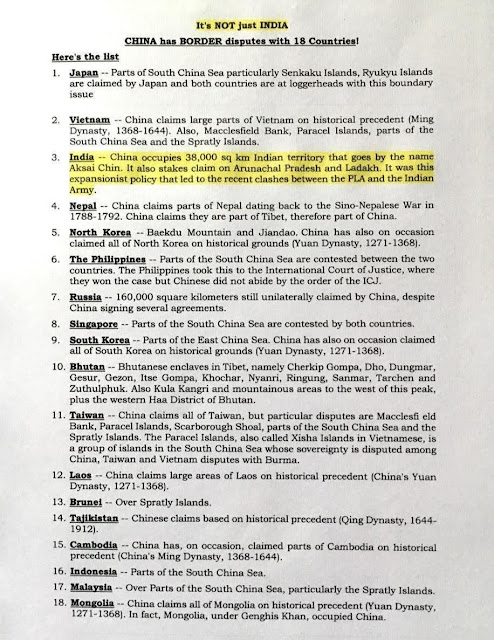Why does China have border disputes with almost every neighbouring country?
Whether or not China has border disputes with every nation it shares a border with or only with six or seven as has been suggested by many, the fact remains that it has major border disputes with India and has resorted to armed aggression against India in 1962 and has supported rogue regimes in Asia such as Pakistan and North Korea. Regardless of what basis the Communist Party of China uses to justify it’s occupation of Tibet and the support of rogue regimes the Chinese position is not accepted by India nor can it be logically be accepted. The Chinese argument has been that the border between India and China was decided by the British in 1909, and thus with out proper Chinese representation nor their envoy to Tibet. This argument is flawed, as India can also argue that it was not independent thus it can not accept this border either. In fact the China which was in history is not the same as the People’s Republic of China either. This is an atheist state which has gone through cultural revolutions and has distanced itself from it cultural and historical basis. The Chinese Communist Party’s position that India is a new country is also based of self flattery, India is an ancient civilization just like China, the Republic of India is the successor state to all previous Indian Empires, India has existed since Emperor Pyadaasi Ashoka unified India under one rule in 250 B.C. this included modern Nepal, Afghanistan, Pakistan,Bangladesh and the current republic of India. Based on this, India can make self beneficial claims just like China. Unfortunately, India began border discussions with China in 1949 with genuinely realistic goals. China on the other decided to further it’s opportunistic interests by putting forth claims which were not justified even the most robust interpretations of history.
1962-After China invaded India, Indian troops struggle to defend India.
China in the late 1950’s decided to build a highway road system through the North Eastern section of Indian Kashmir. India was not even patrolling this area actively. India attempted to solve this problem diplomatically, and China responded to this with an armed conflict in 1962. In this this India lost the Aksai Chin area in the North. Since this point a tenuous situation has existed for India in the border region with China, with repeated intrusions and several tense situations such as in 1967, 1987, and 2017. In each China has tested to see what Indian readiness is compared to their analysis. At the same time China has accepted “Gifts”, from Pakistan included a piece of Pakistani occupied Kashmir. This goes against international law, as a disputed territory can not have pieces given away to other countries.
Since the Chinese occupation by force of Tibet in 1959, Tibetan culture and history have been trampled over. Monasteries were destroyed and desecrated, and it is beyond assessment how many literary works and records were destroyed. The exact number of loss of life is not even possible to calculate as China has maintained denials on these events. India gave the Dalai Lama refuge along with hundreds of thousands of Tibetan refugees who escaped to India in fear for their lives. This act of humanity by India has been viewed by China as an act of hostility. When in good conscious there was no other humane choice India could have made. As refusing Tibetan refugees would have been every principle of humanity as understood in Hinduism and Buddhism both indigenous to the Indian Sub-Continent and upon whose philosophy the five principles for diplomacy with China rested historically. Of course this history changed when China became a communist state in 1949.
Today, China is building and developing projects in Pakistani occupied Kashmir. These are in the form of C.P.E.C. and the BELT initiatives. At the same time China has provided economic, military and nuclear assistance to Pakistan which is a major world sponsor of terrorism. Such a foreign policy is completely opposite to what China lofty proclaims as a peaceful rise. Thus, the border disputes can be viewed to be part of a well thought out foreign policy designed to create a hedgeonomy for China. The policy is built to create uncertainty and to allow China to carry out it’s goals, while generating fear in other states. So far this policy has been successful for China both economically and politically. It has coupled this with Nehru’s blunder of loosing the opportunity for a permanent U.N. security council seat and offering it to China first. Thus, China with it’s U.N. veto has enabled a very self centered foreign policy to trump, India’s vision of inclusion and self reliance for the states which were formed after direct colonialism ended. In this manor the Chinese vision has far great reaching consequences that what appears superficially. China’s policy has enabled countries such as Pakistan and North Korea to become nuclear states, and to continue to act unhindered.
- Vikram Aditya Bedi

Comments
Post a Comment